Month: March 2017
For many in the U.S., buying a home is an essential component of the American dream. A home is also one of the most significant investments you’ll make during your lifetime, and isn’t a decision to make hastily. If you’re feeling overwhelmed at the idea of buying a home, you’re not alone. At Assurance Financial, we know how stressful the process of homebuying can initially seem, and we want to make this exciting step in your life as easy and enjoyable as possible.
Before buying a home, there are a few external factors you’ll want to consider, questions you’ll want to ask yourself to determine whether you’re ready to purchase a home and pros and cons you’ll want to weigh when you find a house you’re interested in. Once you’ve run through your checklist of what to ask when buying a house and what to know before making an offer on a house, we can help you acquire your dream mortgage.
External Factors
Outside of your financial situation, there may be external factors to consider before you decide to buy a home. What are the market’s current interest rates? How is the economy performing? How has nature affected the market? These are all things you should look into before buying a home.

1. Interest Rates
The economy, politics and banks can influence interest rates. The Federal Reserve also regulates these rates in part, though human control of interest rates can sometimes spell trouble for the housing market.
2. The Economy
Various factors, such as politics, employment levels and consumer confidence, compose the economy. When looking for a home in a specific region, you’ll want to look at the market nationally, as well as regionally. The real estate market and economy in Texas may be quite a bit different from the market in Maine, for example. The market may even vary between cities in the same state, so it can be beneficial to do some research into your potential home’s area before jumping in.
3. Impacts of Nature
Natural disasters can significantly affect the real estate market. A devastating storm can cause a thriving market to completely turn around in a matter of days. People may abandon the area, and homeowners may become renters. Listings may increase, but prices may drop and it could take quite some time for the market to rebound.
Plenty of factors from your situation come into play when deciding to buy a house, but be sure you don’t overlook external factors such as interest rates, the economy and the impacts of nature when making your decision about when to enter the market.
Questions to Ask Before Buying a House
Before choosing to buy a home, there are a few questions you may want to ask yourself to determine whether homeownership is the right next step for you. Here are seven of these to get you started.
1. Can I Afford the Down Payment?
The standard rule of thumb when it comes to a down payment on a home is 20%. However, you can also put a down payment of as low as 10% for a conventional loan and 3.5% for a Federal Housing Administration loan. Depending on the type of loan you’re looking to get, do you have enough money to make the down payment? You’ll also need to factor in closing costs, which can cost between 2 and 5% of the home’s value. Though the seller may sometimes contribute to these costs depending on the deal you get and the state of the market, you may still want to ensure you’ve saved up enough to cover these costs.
Putting a down payment of 20% toward your house can offer a range of benefits:

- Your mortgage loan will be smaller.
- You’ll have access to lower mortgage rates.
- You’ll pay less in interest.
- You’ll reduce your insurance premiums.
- You’ll have smaller monthly payments.
The more you can put down on your house up front, the more money you’ll save in the long run.
2. Am I Financially Stable?
Are you currently able to meet your other financial obligations and goals? Are you paying your bills on time every month? Are you consistently achieving your goal for retirement savings? Do you have an emergency fund? Before introducing a mortgage into the mix, you’ll want to ensure you’re covering all your other financial goals and obligations. If you’re able to say you do meet all of your other financial obligations, you may be able to comfortably fit a house into your budget.
A mortgage is a long financial commitment. Even most shorter-term mortgages are at least 10 years. The standard mortgage term is 30 years, so ideally, you’ll want to be financially stable for the duration of your mortgage, which could be several decades. Job security and a steady income are great ways to ensure financial stability, but since job loss can happen to anyone, you’ll want to ensure you can continue paying your mortgage even in the face of losing your source of income.
To prepare for this possibility, you may want to save several months’ worth of living expenses to cover you during your gap in employment. If you work in a field with high demand and you can reasonably expect to get hired in a short amount of time, you may only plan to save up for three to four months of living expenses. If you don’t work in a field with high demand and you anticipate a job loss may leave you unemployed for several months, consider saving up an emergency fund of six to 12 months of living expenses. That way, even if you remain unemployed for an entire year, you won’t have to worry about making the payments on your mortgage and bills every month.
3. How Much House Can I Afford?
Take your existing budget and input the new monthly expenses you can expect after you acquire a mortgage. You’ll want to estimate your principal, interest, taxes and insurance to plug into your budget.

To determine the numbers for your principal and interest, you can use an online mortgage calculator. Experiment to see how much you could comfortably fit into your budget and what amounts would be stretching your budget uncomfortably thin. You can also look at the current rates from a lender like Assurance Financial for different types of loan terms, such as 15-year versus 30-year or conventional versus FHA.
To determine the approximate cost of your property taxes, you can look online for homes for sale in the area you’re interested in and find examples of what the approximate taxes might be. Estimating your insurance may be a little trickier without an address to give your insurance company, but they may still be able to provide you a with reasonable estimate or range.
Other costs potential homeowners may overlook include fees for a homeowners’ association, an alarm system, condo fees or utilities. To get estimates for these services, you can research what residents in the area tend to pay for these expenses or contact the utility company to ask about the costs in that specific neighborhood or area. If you’re upscaling from a small apartment to a larger space, you may also want to increase other living costs that tend to go up when you have more space, like furniture and decor.
4. Can I Secure a Good Mortgage Rate?
First, do you know what you should consider to be a good mortgage rate? In short, a reasonable rate is one you can afford and that works with your budget. Here’s a closer look at the factors that will help you find or qualify for a fair mortgage rate.

- Credit score: Your credit score is probably the most critical factor when it comes to securing a mortgage. A high credit score tells lenders you’re likely someone who will repay them. Lenders will look at your credit history to determine whether you’ll be able to afford your mortgage and consistently make your payments. Higher scores generally result in the lowest rates, but you’re also likely to qualify for a favorable rate with a score in the mid-range. However, if you want to secure an FHA loan, you could get a mortgage with a lower score. You can request a free credit report every year from the three major credit bureaus. Choose from TransUnion, Equifax and Experian to request your credit report to determine whether your credit score could already secure you a good mortgage rate. You may find you need to do a little more improvement before applying for a mortgage.
- Employment history and income: Lenders also look at your employment history. They want to see you’ve held a job for at least two years and what your income is. If you are not employed, you’re unlikely to get a mortgage at all, let alone a mortgage with a good rate. Lenders may also look at your debt-to-income ratio and your assets. They want to feel confident you have the means to pay them back the money you’re borrowing.
5. How Long Do I Plan to Stay Here?
If you aren’t planning on staying in an area for long, buying a home may not the best option for you. Generally, it’s best to buy a house only if you plan on staying in it for at least five years. This length of time allows you to build up equity in your home and make up for the costs that went into buying, selling and moving.
If you plan on moving within a few years, you may want to consider an ARM — adjustable-rate mortgage — which have rates that adjust every year, unlike fixed-rate mortgages. If market conditions are optimal and rates are consistently dropping, an ARM may be the right option for you in a relatively short-term living situation.
6. Am I Ready for the Challenges of Owning a Home?
A significant difference between owning and renting is that when you own a home, you’re entirely responsible for everything inside it. When the refrigerator stops working or the air conditioning system fails, the cost of making these repairs comes out of your pocket. Before buying a home, you may want to have money set aside in anticipation of property and household damages.
The cost of a home isn’t only what you pay up front, but your continued maintenance and upkeep as well. Yard and outdoor maintenance can include mowing the lawn, raking leaves, clearing debris, cleaning out the gutters, power washing the house or resealing the deck. You may need to worry about paying an exterminator to remove bugs or rodents that enter your house. It’s also smart to get your air conditioning and heating systems inspected at least once a year, along with changing air filters a few times throughout the year. These costs are ongoing, so you’ll want to keep these in mind as you make your yearly or multi-year budget.

As with an emergency fund, you may want to consider specifically earmarking some cash for unexpected repairs that might pop up. You may want to follow one of two rules of thumb when deciding how to save up for these potential expenses.
- Save $1 per square foot: Every year, set aside $1 for every square foot of your house. If your home is 2,500 square feet, for example, you should save $2,500 every year.
- Save 1% of the price of the house. This percentage is not the amount of your mortgage, but the value of the home if you put it on the market today. If your home is currently worth $500,000, that means you would save $5,000.
If you want to save the minimum toward home repairs every year, you may follow the first rule of thumb. If you’d rather err on the side of caution, you may want to follow the second rule of thumb.
7. What Do I Want in a Home?

When compiling your list of questions to ask when buying a home, don’t forget to ask yourself what qualities you find desirable in a house. Make a list of your potential home’s must-haves, what you would like it to have and what your dealbreakers might be.
Your must-haves are any factors your home needs to have for you to buy it. Maybe on your must-haves list, you want central heat and air, rather than having to maintain separate heating and A/C units for each room. Or, perhaps your home needs to be one-story so you don’t need to deal with as much daily upkeep and cleaning. Many parents prioritize finding homes in a good school district to benefit their children. Regardless of what you put on your list, you won’t buy a home lacking any of these items.
Your nice-to-haves are perks you would enjoy, but aren’t crucial enough that you would turn down a home that doesn’t have them. These might include a two-car garage or a nice view from the property. If the home does not have these qualities, you’ll still consider purchasing it if it checks all the boxes on your must-have list.
Your list of dealbreakers is anything that would make you not want to buy a home. If you live with multiple people, for example, a dealbreaker for you may be a house with fewer than two bathrooms. Or, maybe you can’t stand the idea of living on a loud, busy street.
If you’ve answered positively to most of these questions, you may be ready to buy a home.
What to Consider Before Making an Offer on a House
Before making an offer on a home, there may be a few factors specific to that house to consider. These factors can include an inspection, other offers and any work you need to get done based on the condition of the home. Here’s what to know before making an offer on a house.
1. Inspection
When you’ve found a house and you want to put an offer in, you will need to get it inspected. Typically, you can take advantage of a 10-day inspection period by bringing in an inspector to assess the house. You may also want to consider hiring people who work in other trades, such as roofing, plumbing and electricity. A home inspector may not be able to catch everything. Bring in someone who is licensed in a specific profession and who will know what to check in a house before buying, tell you what might be wrong with the system and estimate how much it would cost to fix it. When negotiating the price of your home with the seller, having this information can work well in your favor.
2. Other Offers
Competition for a home can strike fear into the hearts of homebuyers, especially those who are entering the market for the first time. They worry about offering more than they can reasonably afford or missing out on their dream home. Here are a few tips for standing out from the crowd with your offer.

- Write a letter to the seller: A personal letter may help you be more memorable as a potential buyer. Selling a home can be a stressful and highly emotional time, and a letter with sentimental value can push you over the edge into their favor.
- Use specific numbers: Specific, rather than round, numbers will stick out more in a seller’s mind and may also put your offer just ahead of other buyers, even if only by a couple hundred dollars.
- Show flexibility: Develop your offer around the seller’s specific needs. A seller moving out of the state may want a sooner closing date, so being flexible with the seller may earn you the bonus points that get you the home of your dreams.
Remember, even if you lose out on a bid, you’ll eventually find the right house at the right time with the right bid, and making an offer doesn’t cost anything.
3. Necessary Home Improvements
If you need to do work or make improvements to the home, you’ll want to consider whether the costs of these improvements can fit into your budget. If you anticipate the costs will be too high, you may want to reconsider purchasing the house. On the other hand, if the improvements are minor and the costs can reasonably fit into your budget, you may want to move forward with purchasing. Replacing the roof, for example, could be a pricey home improvement. In contrast, painting a few rooms or installing a new faucet might be a remodeling project that’s within your budget.

Find Your Financing With Assurance Financial
At Assurance Financial, we want to help you achieve your American dream of homeownership. With us, you can find the home of your dreams with the ideal mortgage terms. The homebuying process doesn’t have to be overwhelming when you work with the Assurance Financial team.
When applying for a mortgage, you’ll want to have a licensed loan officer to help you through the process. Our application technology and end-to-end processing under one roof will make your loan process quick and straightforward.

Find a loan officer near you today at Assurance Financial to get started, and discover why we’re one of the best lenders for financing a home mortgage.
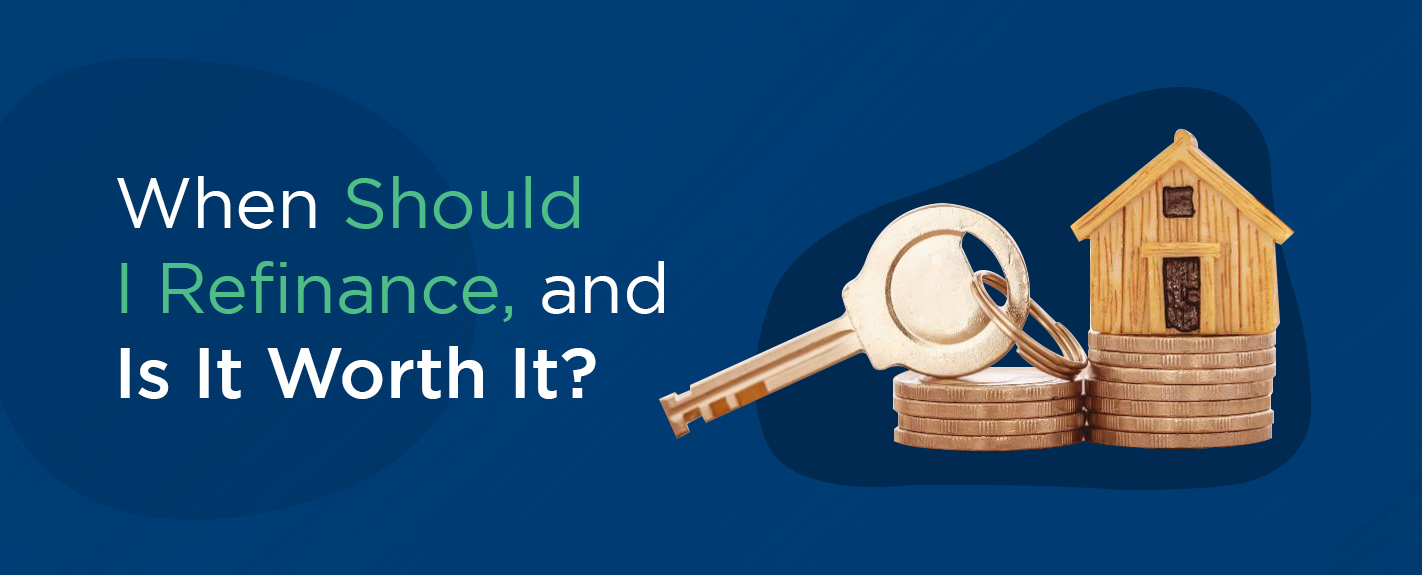
Though there are many reasons a homeowner might opt to refinance, the most common reasons for refinancing a mortgage are to lower the interest rate and to lower the monthly payments. A homeowner’s needs may change as their financial situation changes, meaning the mortgage terms you chose a year or two ago may not be the mortgage terms you want today. With today’s historically low rates, now is a good time to begin considering refinancing your mortgage with Assurance Financial.
What Does It Mean to Refinance?

When it comes to mortgages, you may have heard the term refinancing. But what does it actually mean to refinance your home?
Refinancing your mortgage essentially means acquiring a new mortgage to replace your existing mortgage. This new loan pays off the remainder of your existing mortgage, and then you become responsible for paying off your new loan. As with your existing mortgage, this new mortgage will also require application fees, a title search and an appraisal.
But how do you know if you should refinance your mortgage? Is it smart to refinance your mortgage? If it is the right decision for you, how do you go about refinancing, and what do you need to refinance your home? First, define your financial goals. Once you know what you hope to accomplish, then consider your refinancing options.
The Types of Refinance Mortgages
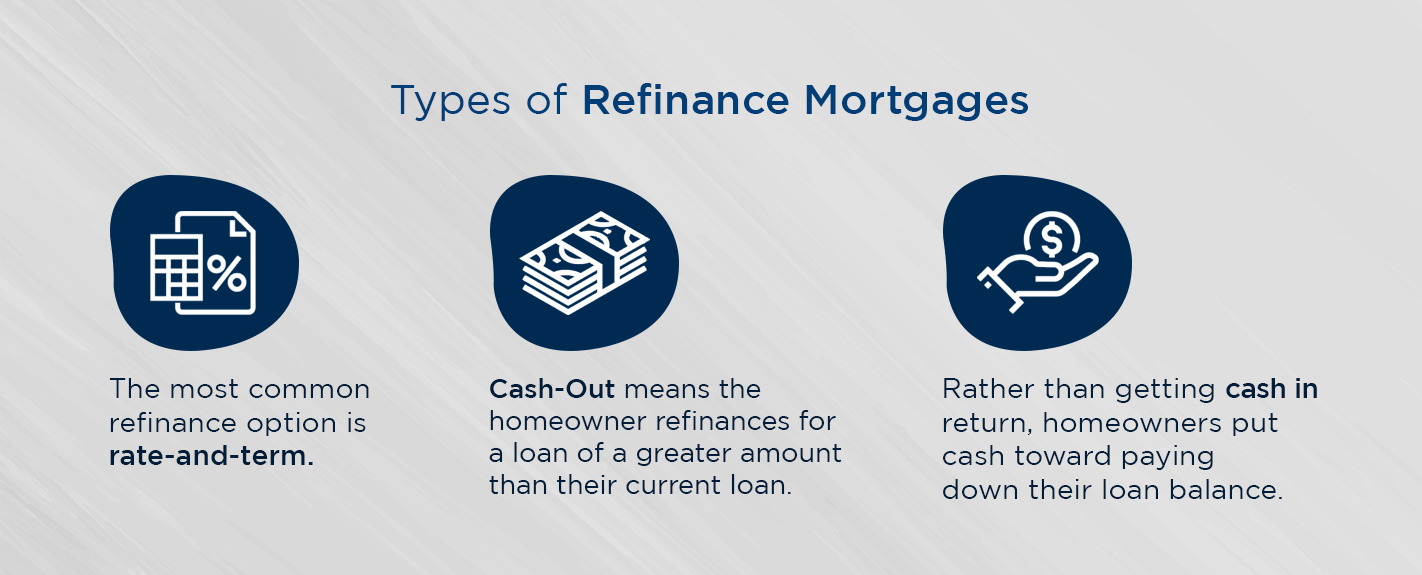
The three refinance mortgages you can choose from are known as rate-and-term, cash-out and cash-in.
1. Rate-and-Term
The most common refinance option is rate-and-term. This means that the term or rate of your loan, or possibly both, are different from your original mortgage. The term of your loan may change from a 30-year fixed rate to a 15-year fixed rate. Or maybe you’ll refinance from a 30-year mortgage at a 5 percent interest rate to a 30-year mortgage at a 4 percent interest rate. This could result in major savings in the long run.
2. Cash-Out
This refinance option means the homeowner refinances for a loan of a greater amount than their current loan. The homeowner receives the difference. So if you start with an amount of $100,000 owed on your current mortgage and you refinance for a loan of $120,000, you will receive $20,000 cash out. Banks typically see this refinance option as riskier, but when used responsibly, it can be an effective strategy for homeowners who want to pay off high-interest debt or build equity in their homes.
3. Cash-In
The opposite of a cash-out refinance mortgage is a cash-in refinance. Rather than getting cash in return, homeowners put cash toward paying down their loan balance. This can help homeowners access lower mortgage rates that are typically available only for lower loans or to eliminate mortgage insurance premiums, saving homeowners money.
The type of refinance mortgage you choose will depend on your individual financial situation and your goals.
So how do you know if refinancing your mortgage is right for you?
Signs It’s Time to Refinance
When you’ve first signed your mortgage, it may feel like everything is set in stone, but for homeowners, this is far from the truth. The decision to refinance your mortgage gives you the option to save on interest, take some time off your loan term, or cash out on your equity. If refinancing will lower the amount of interest you’ll pay on your mortgage, then you may find this to be an option worth exploring. Not sure refinancing your mortgage is the right financial move for you? Here are a few signs refinancing may be the right next step for you.
1. A Lower Interest Rate is Possible
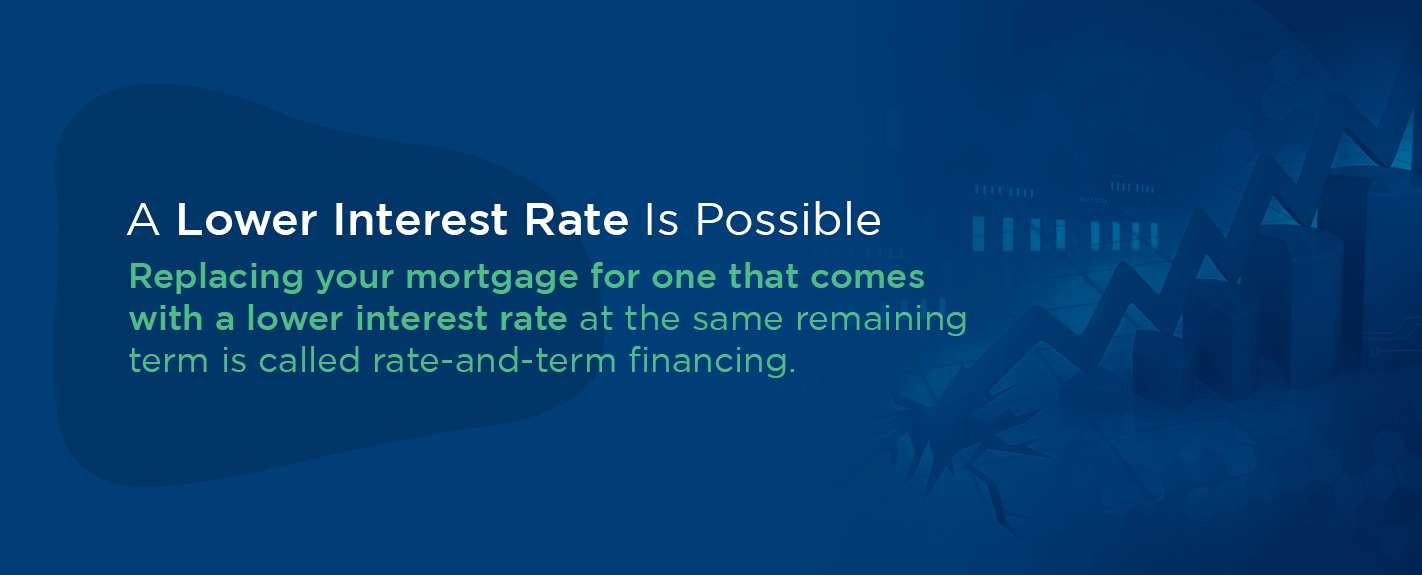
Mortgage interest rates fluctuate constantly. Several factors impact interest rates, such as the monetary policy of the U.S. Federal Reserve, inflation, the economy and market. If the rates are currently lower than what you are paying, you may want to consider refinancing.
Replacing your mortgage for one that comes with a lower interest rate at the same remaining term is called rate-and-term financing. What decrease in rate is enough to consider refinancing? Generally, if you can get a rate that is at least one to two percent less than your existing rate, you can consider refinancing your mortgage. No rule of thumb can apply to all individuals and circumstances, however. While a one percent rate of interest may result in a large amount of savings for someone with a million-dollar mortgage, the same may not be true for someone with a mortgage that’s only $100,000.
You may even consider refinancing when the percentage saved is less than one percent. Though conventional advice calls for at least a one percent reduction, this rule of thumb is a holdover from the 50s, when loans were smaller, and homeowners continued to live in their homes until death. Today, with much larger loan sizes, a smaller percentage reduction can still result in significant savings.
Take the time to check the updated interest rate and compare it to your initial rate. Remember, your credit score determines your individual interest rate, meaning a lower rate isn’t always promised.
2. Your Credit Score Has Improved
If you’ve been working on rebuilding your credit, refinancing could benefit you. Generally, the higher your credit score, the lower your interest rate. Keep in mind, individual lenders determine the worth of your credit score, so individuals with a score that falls above 700 typically receive the lowest rates, but it is possible for you to get a great deal even if your score is between 600 and 700.
With a loan savings calculator, you can determine your APR, monthly payment and total interest depending on your credit score, type of loan, principal loan amount and your state of residence. A 30-year fixed loan for a principal amount of $100,000 at a credit score of 620 to 639 would give you an approximate APR of 5.006 percent. This adds up to a monthly payment of $537 and a total interest amount of a whopping $93,388.
What would happen if you increased your credit score to the 760 to 850 range? Your APR would drop to 3.417 percent, your monthly payment would drop to $444, and your total interest paid would be only $59,993. That’s a difference of $33,395 simply based on credit score.
One of the most important factors that mortgage lenders take into consideration is your credit history. Even a mere one point increase in your credit score can reduce mortgage fees. Fortunately, there are plenty of methods to increase your credit score to ensure you get a great mortgage interest rate:
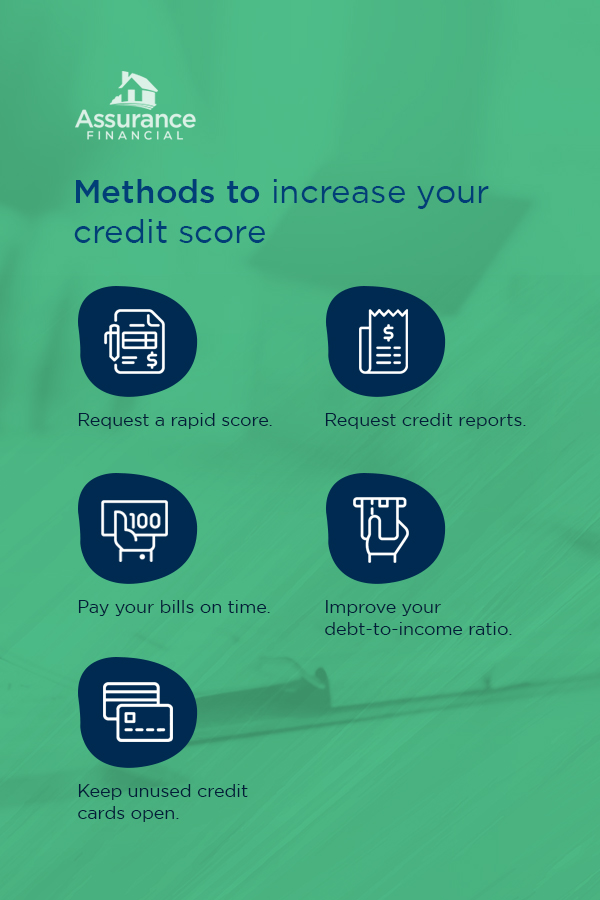
- Request a rapid rescore.
- A rescore can purge any errors that are hurting your credit score, potentially boosting your score from a few points to 100 points in a matter of days. Mortgage lenders can use this method to help borrowers increase their credit scores.
- Request credit reports. You can request one free credit report a year from three major bureaus –– Equifax, Experian and TransUnion. Report any errors you find as soon as possible. If you’re focusing on improving your credit score over several months, request a free credit report every four months from one of the three bureaus so you can track how your credit score is improving.
- Pay your bills on time. Your past and present payment performance are considered to be a reliable indicator of your future payment performance to lenders. Paying late or missing payments is a quick way to harm your credit score, so be certain you’re making consistent, on-time payments. Use automated payments to ensure you don’t forget to pay any of your bills.
- Improve your debt-to-income ratio. You can increase your credit score when you pay off debt and keep your credit card balances low. The general recommendation is to keep your credit use at 30 percent –– meaning you use under 30 percent of your credit line. If your credit limit is $2,000, that means you shouldn’t charge over $600.
- Keep unused credit cards open. By not closing unused credit cards that aren’t costing you any annual fees, you can retain your credit mix and credit history and keep your use ratio low.
If your credit score has improved and you think you may qualify for a lower interest rate on your mortgage, you may want to consider refinancing. If you decide refinancing may be a viable option for you, be sure to perform the calculations yourself, as mortgage rates fluctuate and may drop even lower.
3. You’ve Seen a Jump in Income
An increase in income can be great if you’re looking to refinance to a shorter loan term. Going from a 30-year mortgage to a 15-year term can save you thousands of dollars in interest.
As in the example above, a 30-year fixed loan of $100,000 at a high credit score of 760 to 850 would result in a monthly payment of $444 and a total interest amount of $59,993 at an APR of 2.845 percent. If you reduce your loan term to 15 years, however, the APR on the same amount of loan principal and at the same credit score changes to 2.845 percent, and the total interest amount drops to $22,967 –– a difference of $37,026. That’s an even bigger jump in savings than by improving your credit score.
A caveat of the 15-year loan term, though, is your monthly payment increases. At a 30-year term, your monthly payment is $444. However, with a 15-year term, your monthly payment is $683. If your budget can comfortably accommodate an additional $239 a month, then this may be an excellent option for you. But if the increased monthly payment makes your budget uncomfortably tighter, you may want to consider sticking with your 30-year loan term.
With a 15-year fixed loan term, you may pay more toward your mortgage each month, but you’ll also see huge savings in the amount of interest you pay over the term of your loan. High-income earners or those with enough wiggle room in their budget may want to opt for the shorter loan term.
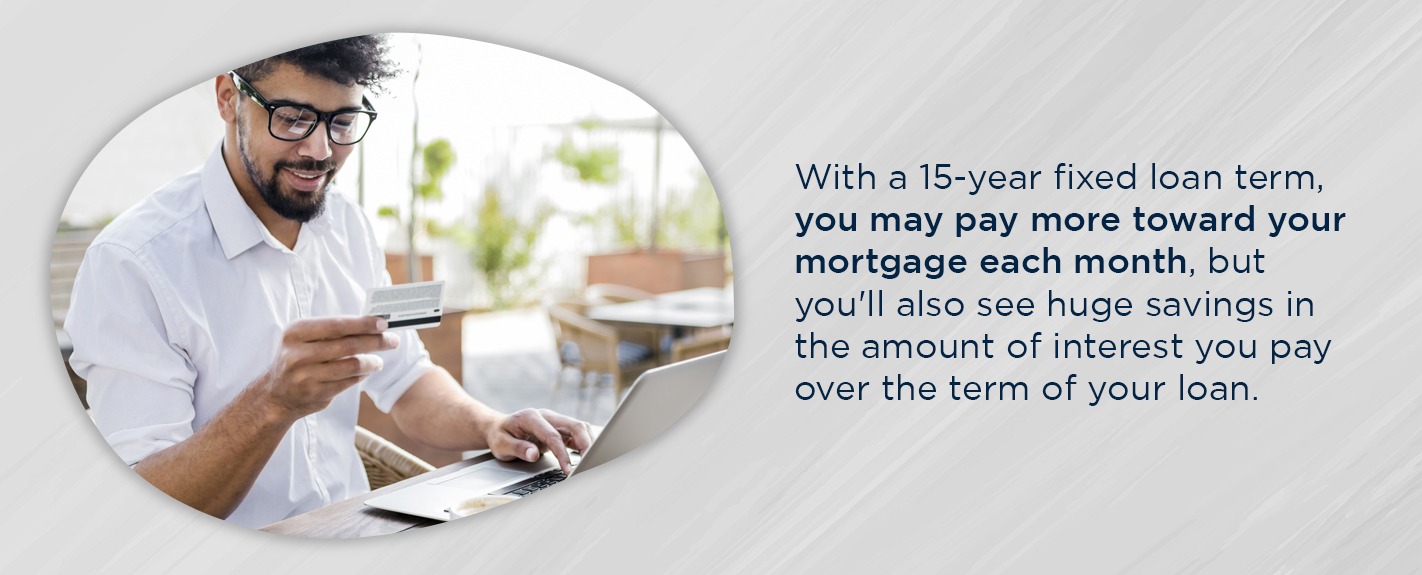
4. You Have Concerns About Your ARM Adjusting
Adjustable rate mortgages (ARMs) vary over the life of the loan. The rates depend on not only market conditions, but also the type of loan you have. Some ARMs adjust once a year, while others adjust after five or seven years. In most cases, you’ll pay less interest with an adjustable rate mortgage and have lower monthly payments early in your loan term.
If your existing mortgage is at a fixed-rate and you anticipate that interest rates will continue falling, you might consider switching to an adjustable rate mortgage. If you plan to move within a few years, changing to an ARM may make the most sense for your situation since you won’t be in your home long enough to see the loan’s interest rate rise.
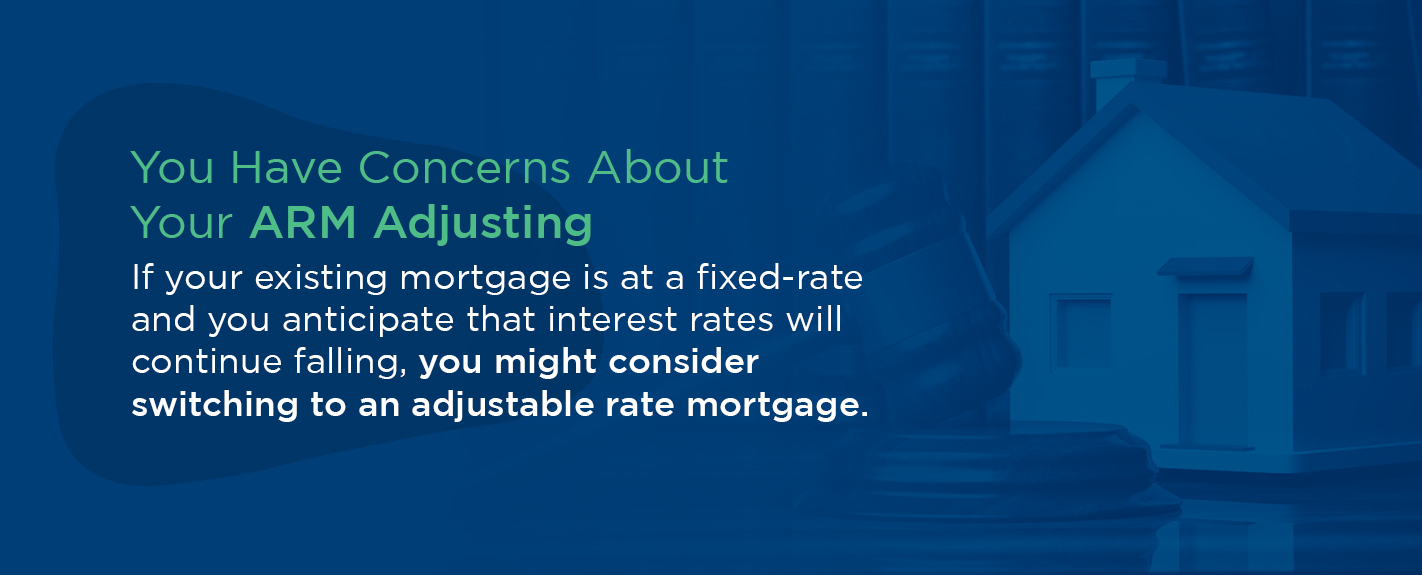
Alternatively, the most unsettling thing about ARMs is when it’s time for the loan to adjust, interest rates and payments may skyrocket. Refinancing and switching over to a fixed rate mortgage may be a good option for you if you’re worried you won’t be able to afford your payments when your loan adjusts.
5. The Value of Your Home Has Increased
Since 2011, the values of homes has risen from an average of $250,000 to an average of $394,000. Yet many homeowners don’t refinance their mortgages when the value of their home increases. If your home’s value has increased, refinancing may be a beneficial option for you. If you’re looking quickly to pay off other high-interest debts or fund major purchases, this avenue may be even more appealing.
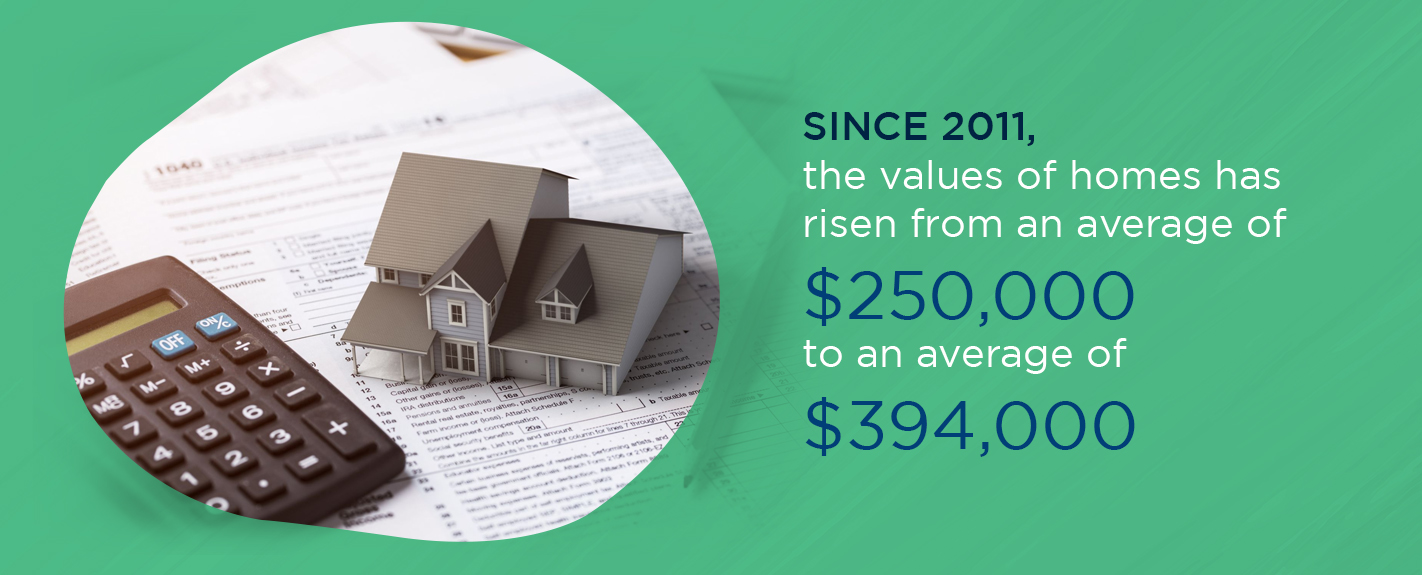
Cash-out refinancing is a financing option that allows you to acquire a new, larger mortgage so you can receive the difference in cash between your new mortgage and your previous mortgage. For example, maybe your house was originally valued at $250,000. You put 20 percent toward a downpayment –– $50,000.
Your mortgage of $200,000 is now $140,000 after a few years of payments, but now your house has increased in value from $250,000 to $300,000. You may now opt to refinance your mortgage for more than your remaining balance of $140,000. If you refinance for $165,000, you can use that $25,000 difference to pay off high-interest debt, make home improvements or fund major purchases.
If you’re in a financial situation in which you know you can comfortably pay back that additional $25,000 of mortgage debt, this may be the right move for you. If you’re thinking you may use this cash to pay off other high-interest debt, be sure to calculate whether you’ll end up paying more interest for that debt than for your mortgage. If you’ll ultimately pay more interest for other high-interest debts, then cash-out refinancing may be a great choice for you. If you’ll pay more in mortgage interest, you may want to stick with your existing mortgage.
Be sure to check the value of your property so you can have an accurate estimate before refinancing your mortgage. Over or underestimating your home’s value may result in you overpaying and saving less.
If any of these five signs apply to you, it may be time to consider refinancing your mortgage.
What Is the Refinancing Process?
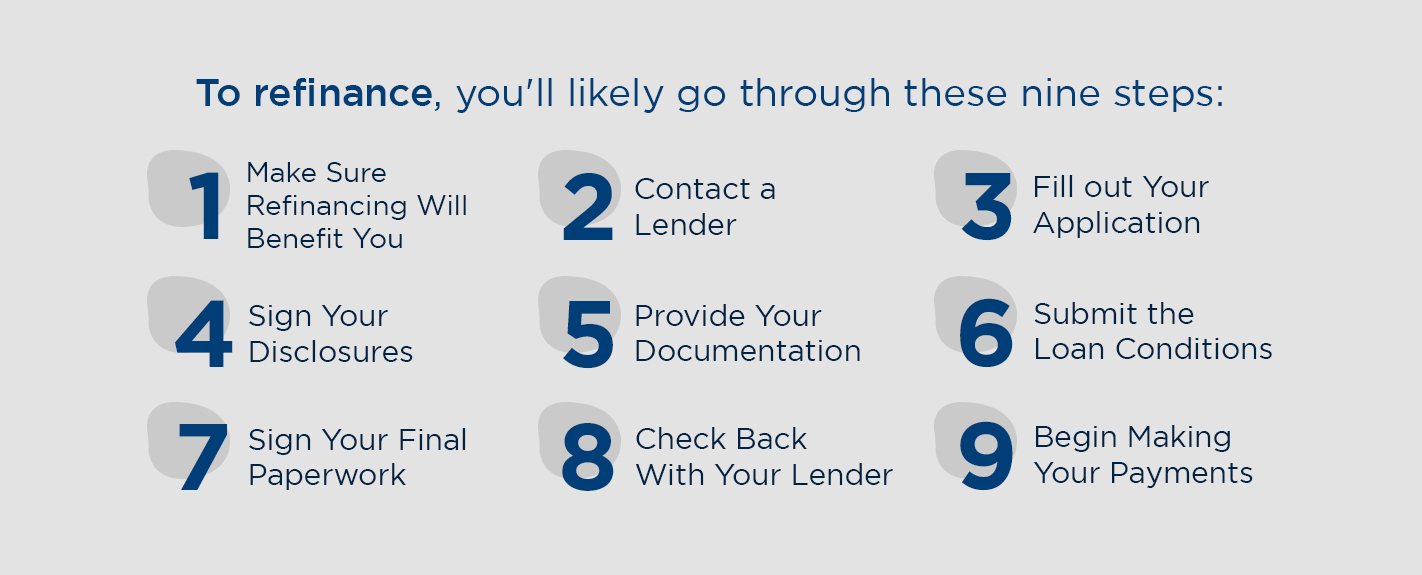
Whether you’re refinancing to lower your monthly payments, to lower your interest rate or to free up some cash to pay off high-interest debt or build equity in your home, you’ll probably want to know what you can expect from the process of refinancing a mortgage before jumping right in. To refinance, you’ll likely go through these nine steps:
1. Make Sure Refinancing Will Benefit You
Your first step in refinancing your mortgage is making sure that refinancing will be beneficial for you. Know what your goal is and determine whether you can attain it. Are current rates low enough for you? Will you ultimately be saving money? If you cash out, make sure having that money right now will outweigh the extra years spent in debt. Everyone’s financial situation and priorities are different, so only you can decide what the best decision is for you.
2. Contact a Lender
With Assurance Financial, we want to make your refinancing process as quick and painless as possible. We offer the chance to get pre-qualified in just 15 minutes, with a no obligation quote and a free rate quote. You can apply online or with one of our experts licensed across the country. We have every type of loan available, and because we’re an independent lender, we won’t pass around your loan or data to anyone else like other mortgage brokers. With no obligation, we can check your credit, provide you with a rate quote and send you the numbers.
3. Fill out Your Application
Once you are ready to refinance, you can begin your application with us.
4. Sign Your Disclosures
We’ll send you the initial disclosures for you to sign and you may also take this opportunity to verify the loan terms and ensure you’re accomplishing your goal of either lowering your rate or cashing out.
5. Provide Your Documentation
After signing, you’ll then provide your documentation to us, such as asset verification and income.
6. Submit the Loan Conditions
We’ll then send your paperwork to one of our in-house underwriters who will let us know if any additional items are needed.
7. Sign Your Final Paperwork
After approval, you’ll sign with a notary.
8. Check Back With Your Lender
After three days, during which you can cancel your refinance for no cost, your loan will be funded. At this point, your previous mortgage will be fully paid.
9. Begin Making Your Payments
Now you’re done with the refinancing process! You can start making the payments on your new mortgage, which will be due in 30 to 60 days after the funding process.
Refinancing a mortgage can seem overwhelming at the start, but it doesn’t have to be. With Assurance Financial, we strive to make your journey to refinancing as quick and simple as possible.
Refinancing With Assurance Financial

Refinancing your mortgage may be a smart move if you’re still in the early years of your mortgage and can get a lower interest rate by refinancing.
If you want to save money, refinancing your mortgage may be the right move for you.
You can refinance with us today at Assurance Financial. For most Americans, the American Dream includes homeownership. We want you to own the house of your dreams –– with the mortgage terms of your dreams. You can apply with us and get instant verification by signing into your bank accounts and payroll platforms, so there’s no need to fax any statements.
To get a mortgage, you need a licensed loan officer on your side, and we’re here to help. We use the latest in application technology to make starting the loan process fast and simple, and we offer the service you need for end-to-end processing all under one roof.
Curious how we have an average 4.98 star-rating across thousands of reviews? Discover why we’re one of the best lenders for your mortgage refinance today. Find a loan officer near you with us at Assurance Financial for more information on refinancing.
Buying a home is a big deal, and most likely the most expensive purchase you’ll make in your lifetime. Thankfully, your purchase comes with a few perks. There are several tax deductions available when buying a home that can put a good chunk of cash back in your pocket. Here are a few tax advantages that make your home a great investment.
Mortgage Tax Deduction Benefits when Buying a Home
Tax codes give homeowners the choice to deduct the mortgage interest from their tax obligations. This can equal to a huge deduction for many owners since interest payments make up a large amount of your mortgage payment.
Also, when buying a home you can begin claiming points on your loan the first year. These points are called origination fees and can be claimed even if the seller pays for them. Origination fees of one percent, or more, are common and can add up to big savings for buyers.
Property tax is also deductible. Real estate property taxes paid on your home are fully deductible for income tax purposes.
Tax Deduction on Home Equity Lines
You can also deduct the interest paid on a home equity loan. This gives you the chance to shift your credit card debts to your home equity loan. You’ll pay a much lower interest rate than those offered by credit card companies and get a deduction on the interest as well.
Home-office deductions
If you are buying a home and self-employed or do freelance work in a home office, deductions can save you money on your taxes. The IRS allows you to write off a portion of your regular expenses that you spend to conduct business at home. This includes electricity, water, Internet, and other costs. When calculating your home office deduction, measure what percentage of your living space your offices takes up and how much you spend each year.
